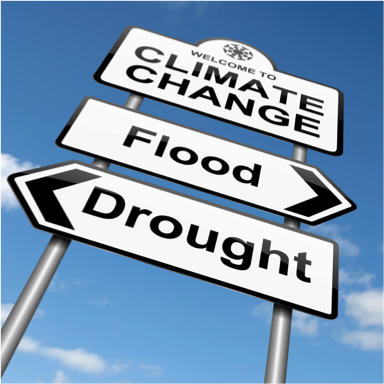New 1-Hour Course: CLIMATE CHANGE CONSIDERED
GEOS 489/689; AGEC 489/689
M 3:00 – 3:50, AGLS 115
 Multi-disciplinary Course for Students from All Colleges and Departments - Climate change will influence your future, and you will likely have to take climate change into consideration in your future profession. If you are majoring in any of the following fields, this new course will benefit you: agriculture; geosciences; engineering; architecture and urban planning; political, social, and behavioral sciences; medicine; and law. Employers will be looking for people with the knowledge to make science-based decisions. This class, will provide you with the skills to
Multi-disciplinary Course for Students from All Colleges and Departments - Climate change will influence your future, and you will likely have to take climate change into consideration in your future profession. If you are majoring in any of the following fields, this new course will benefit you: agriculture; geosciences; engineering; architecture and urban planning; political, social, and behavioral sciences; medicine; and law. Employers will be looking for people with the knowledge to make science-based decisions. This class, will provide you with the skills to
- understand the science behind climate change,
- appreciate, evaluate and communicate the ongoing nature of climate change,
- classify, assess and judge impacts and vulnerability/effects of climate change,
- formulate and appraise mitigation and adaptation options, and
- understand the origins of difficulties to enact societal changes to address climate change.
Develop a Professional Advantage - You will gain a professional advantage from having specialized knowledge and experience not normally part of your degree plan, but highly relevant nonetheless. This class is for students from all majors. It is designed and will be taught by faculty members from three colleges: Agriculture and Life Sciences, Architecture, and Geosciences.
Learn from the Very Best - TAMU has faculty members who are among the world’s leading experts in climate science, climate change, societal and human dimensions of climate change, mitigation of and adaptation to climate change, and communicating climate change to the public. They are contributing authors of the Intergovernmental Panel on Climate Change reports, the US National Climate Assessment reports, other regional and national climate change impact reports, and hundreds of scientific and scholarly journal articles. Students have a unique opportunity to learn from this concentration of knowledge and be better prepared to enter the workforce.
 Topics and Sources – Topics to be covered in the course include: The physics of climate change; Regional dimensions of climate change; Extreme weather events; Vulnerability of agriculture, urban regions, coastal areas, water resources, and ecosystem function to climate change; Strategies for adaptation and mitigation; Risks at the local level; Trends in architecture and construction for adaptation and mitigation; Global sustainability; and Communicating climate change information to a non-science audience.
Topics and Sources – Topics to be covered in the course include: The physics of climate change; Regional dimensions of climate change; Extreme weather events; Vulnerability of agriculture, urban regions, coastal areas, water resources, and ecosystem function to climate change; Strategies for adaptation and mitigation; Risks at the local level; Trends in architecture and construction for adaptation and mitigation; Global sustainability; and Communicating climate change information to a non-science audience.

